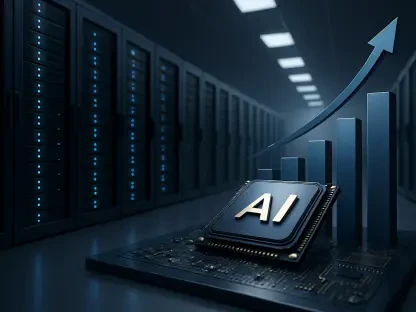The rapid evolution of technology has ushered in transformative changes across various sectors, with healthcare witnessing significant advancements. Central to these changes are artificial intelligence (AI) and predictive analytics, which have become essential to modernizing healthcare delivery and optimizing patient outcomes. These technologies harness the burgeoning reservoir of healthcare data, unlocking insights that were previously unattainable. As digitalization spreads, the potential to analyze vast datasets becomes more feasible, leading to improved patient care, strategic resource management, and streamlined clinical processes.
AI-Driven Frameworks in Healthcare
Investment and Initiatives in AI Technology
The healthcare sector is seeing unprecedented investments in AI-driven frameworks, a testament to the technology’s growing prominence. A notable example is the UK’s National Health Service (NHS), which has committed substantial resources to establish a comprehensive framework supporting AI diagnostic tools and predictive capabilities. The initiative, worth nearly 200 million pounds, marks a significant milestone toward implementing AI in routine healthcare operations, with the NHS setting ambitious goals for large-scale integration. This endeavor reflects the broader industry trend where AI technologies are being actively adopted to enhance diagnostic accuracy, predict healthcare demand, and manage costs effectively.
The Role of Data in Predictive Analytics
Central to the success of AI in healthcare is its unparalleled ability to process vast quantities of health data, ranging from electronic health records to real-time monitoring from wearable devices. These datasets fuel advanced analytics, allowing healthcare providers to refine clinical decision-making and improve patient management. Previously, healthcare data was used primarily to support retrospective decision-making processes, offering limited insights into error patterns or patient outcomes. Today, with enhanced analytical capabilities, AI systems are evolving into proactive tools that anticipate healthcare challenges and support preventative measures. The integration of AI into daily healthcare paradigms is increasingly viewed as indispensable for fostering a responsive and adaptive health system.
Expanding Role of AI in Clinical Settings
Enhancing Diagnostics and Treatment
In clinical settings, AI’s role extends beyond mere data analysis to transforming diagnostics and treatment methodologies. Predictive analytics allows for the early detection of potential health issues, enabling timely interventions and crafting targeted treatment plans. AI-powered diagnostic tools present an opportunity to increase accuracy in identifying medical conditions, thus informing the clinician’s decision when formulating treatment strategies. For instance, AI is instrumental in identifying intricate patterns in imaging data, leading to early detection of conditions such as cancer or cardiovascular diseases, which significantly improves treatment success rates and reduces unnecessary medical procedures.
Personalized Medicine and Patient Care
AI also plays a crucial role in advancing personalized medicine by tailoring treatment pathways to individual patient profiles. By leveraging historical data, genetic information, and patient responses to past therapies, AI systems recommend personalized treatment options that maximize efficacy while minimizing adverse effects. This individualized approach not only enhances patient satisfaction and care outcomes but also holds promise for reducing healthcare costs through improved resource allocation. The continuous analysis of patient data allows AI to adapt strategies over time, ensuring that care plans remain aligned with the latest medical insights and technological advancements.
Operational Efficiency and Patient Monitoring
Streamlining Healthcare Operations
One of the transformative aspects of AI within healthcare is its impact on streamlining operations and enhancing efficiency. As hospitals and clinics grapple with growing patient demands, AI systems provide valuable support in optimizing resource management, scheduling, and logistical planning. Predictive analytics models forecast patient flow, bed occupancy rates, and resource utilization, thereby equipping healthcare facilities to allocate staff and equipment effectively. Furthermore, AI’s predictive prowess extends to financial management, helping healthcare administrators anticipate budgetary requirements and manage costs sustainably. Through these enhancements, healthcare providers can focus more on delivering quality care and improving patient outcomes.
Improved Patient Surveillance and Engagement
Beyond operational efficiencies, AI and predictive analytics revolutionize patient surveillance and engagement, ensuring comprehensive health management. By integrating data from diverse sources, including mobile apps and remote monitoring devices, AI systems offer granular insights into a patient’s health status. Predictive analytics can identify deviations in health metrics, prompting preemptive clinical interventions that prevent complications and hospital admissions. Such technologies facilitate a proactive healthcare model where patients receive personalized attention and care continuity, extending into their homes. Effective patient engagement is further bolstered by AI-powered platforms that remind patients of medication schedules, track their adherence, and remotely monitor vital signs.
AI-Facilitated Research and Development
Accelerating Clinical Trials and Discoveries
AI’s capabilities extend significantly into research and development, particularly in expediting clinical trials and fostering new discoveries. AI algorithms automate processes such as participant selection, monitoring trial progress, and analyzing outcomes, thus enhancing the efficiency and accuracy of clinical studies. By streamlining these aspects, AI reduces the time and costs associated with research, accelerating the drug discovery timeline and bringing new treatments to market more swiftly. AI’s ability to process and interpret large volumes of research data further aids in uncovering novel therapeutic avenues, providing researchers with deeper insights into disease mechanisms and potential treatment strategies.
Innovative Technologies in Healthcare Research
In addition to streamlining existing research methodologies, AI is instrumental in developing innovative healthcare technologies. These include AI-driven platforms that analyze genetic data, identify biomarkers, and predict patient responses to treatment. Such advancements hold potential for groundbreaking discoveries, expanding the arsenal of tools available to clinicians and researchers. The synergy between AI and traditional research efforts enhances precision medicine’s reach, offering a unified approach to understanding complex medical conditions and developing tailored therapies. As AI continues to penetrate the healthcare research domain, it promises to push the boundaries of innovation, leading to a future where healthcare is both predictive and preventive.
Navigating Challenges and Ethical Considerations
Addressing Data Privacy and Security Concerns
Despite AI’s promise in revolutionizing healthcare, the journey is not without challenges, particularly regarding data privacy and security. As the collection and analysis of patient data expand, so do the risks associated with data breaches and unauthorized access. Ensuring robust cybersecurity measures and establishing strict data governance frameworks are vital in maintaining patient trust and safeguarding sensitive information. Collaboration among stakeholders—technology companies, healthcare providers, policymakers, and regulators—is essential in developing comprehensive strategies that protect patient data while facilitating innovation and progress in AI-driven healthcare.
Balancing Innovation with Ethical Practices
The swift advancement of technology has brought about transformative changes in various fields, notably in healthcare, where remarkable progress is being observed. Central to these advancements are artificial intelligence (AI) and predictive analytics, pivotal in modernizing healthcare delivery and enhancing patient outcomes. These technologies leverage the vast amount of healthcare data available today, offering insights that were previously impossible to achieve. As digitalization becomes more widespread, the ability to analyze extensive datasets becomes increasingly practical, leading to improved patient care. This, in turn, supports better strategic management of resources and more efficient clinical processes. Furthermore, AI assists in diagnostic accuracy, treatment personalization, and anticipates potential health issues before they become critical, paving the way for a proactive approach in medicine. The integration of these technologies fosters an era where medical solutions are both personalized and predictive, fundamentally reshaping the landscape of healthcare.









